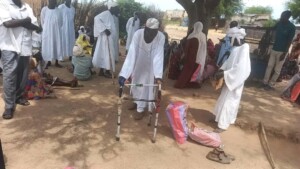Shortage of medics leads to closure of hospitals in Sudan
Sudan’s Minister of Information reported on Wednesday that many public and private hospitals in the country are closed due to a shortage of medical staff. Khartoum is working to bring back 18,000 Sudanese nationals stranded in 22 countries. The number of recorded coronavirus cases in the country increased to 5,310.
 The Khartoum Teaching Hospital (SUNA)
The Khartoum Teaching Hospital (SUNA)
Sudan’s Minister of Information and Culture reported on Wednesday that many public and private hospitals in the country are closed due to a shortage of medical staff. Khartoum is working to bring back 18,000 Sudanese nationals stranded in 22 countries. The number of recorded coronavirus cases in the country increased to 5,310.
In a press conference on Wednesday, Information Minister Feisal Mohamed Saleh denied rumours that hospitals were closed by a decision of the High Committee for Health Emergencies. He said that only clinics stopped receiving patients because the committee decided that doctors should focus on health emergencies, including Covid-19 patients.
The hospitals closed for various reasons, the most important being the lack of doctors. There have not been many new appointments of medical staff for 15 years, Saleh explained.
Many medics also stayed at home for fear of contracting coronavirus, calling for the provision of Personal Protection Equipment (PPEs), and clear regulations for protection against abuse and safe transport to the hospitals during curfew hours.
The minister reported that a number of medics, including those who retired early from private hospitals, gradually resumed working at the hospitals. Many returned following the decision by the Ministry of Finance to employ them.
The government is also working on the provision of decent housing for medical personnel. Saleh said it is expected that most hospitals will open their doors soon.
People living in the densely populated Ombadda locality in Omdurman told Radio Dabanga last week that “many people are dying without seeing a doctor”. They further said that a number of the fatally ill patients did not show symptoms linked with Covid-19.
Relatives of chronic patients told Radio Dabanga in end May that the shut-down of a number of hospitals and health centres in the country has increased the mortality rates among people suffering from chronic conditions. “Many people have died, moving from one hospital to another seeking help.” They said that because of the increasing number of Covid-19 cases and the high prices for medicines, no one is paying attention to this group.
The Faculty of Medicine at the University of El Fasher in North Darfur has studied the sudden rise of the mortality rates in El Fasher in the past weeks. The investigation showed that 68 per cent of the patients had other symptoms than those linked to the coronavirus. “We do not rule out that these patients also suffered from Covid-19,” the deputy dean of the faculty said.
Stranded
The Information Minister as well announced that the about 18,000 Sudanese stranded in 22 countries because of coronavirus restrictions will be able to return in batches.
They must officially agree to be quarantined in official isolation centres, now being prepared in Khartoum and the states, under the supervision of the authorities.
So far, the government kept them abroad. The Sudanese embassies were instructed to sustain them, Saleh said. “The decision to ban the return of the stranded is very harsh, but it was necessary to protect 40 million Sudanese citizens.”
New cases
On Wednesday, the federal Ministry of Health reported 137 new coronavirus patients, and nine deaths.
The total number of registered Covid-19 cases in the country since the first case was recorded in mid-March is 5,310. At least 307 people died of the infectious disease.
Isolation centres in northern Sudan’s River Nile state have witnessed an increase in suspected coronavirus cases since the Eid El Fitir holiday that began on May 25.
The centres received 69 suspected cases since the holiday, including 22 confirmed cases, of which seven are medics. The number of deaths reached three, including medical staff, Namarig Sirelkhatim, member of the state’s emergency committee, told Radio Dabanga from Ed Damer on Wednesday.
She explained that most of the suspected cases come from the gold mining areas, and called on the authorities to enhance control of the borders with other states and the ban on gatherings.
Radio Dabanga’s editorial independence means that we can continue to provide factual updates about political developments to Sudanese and international actors, educate people about how to avoid outbreaks of infectious diseases, and provide a window to the world for those in all corners of Sudan. Support Radio Dabanga for as little as €2.50, the equivalent of a cup of coffee.












 and then
and then